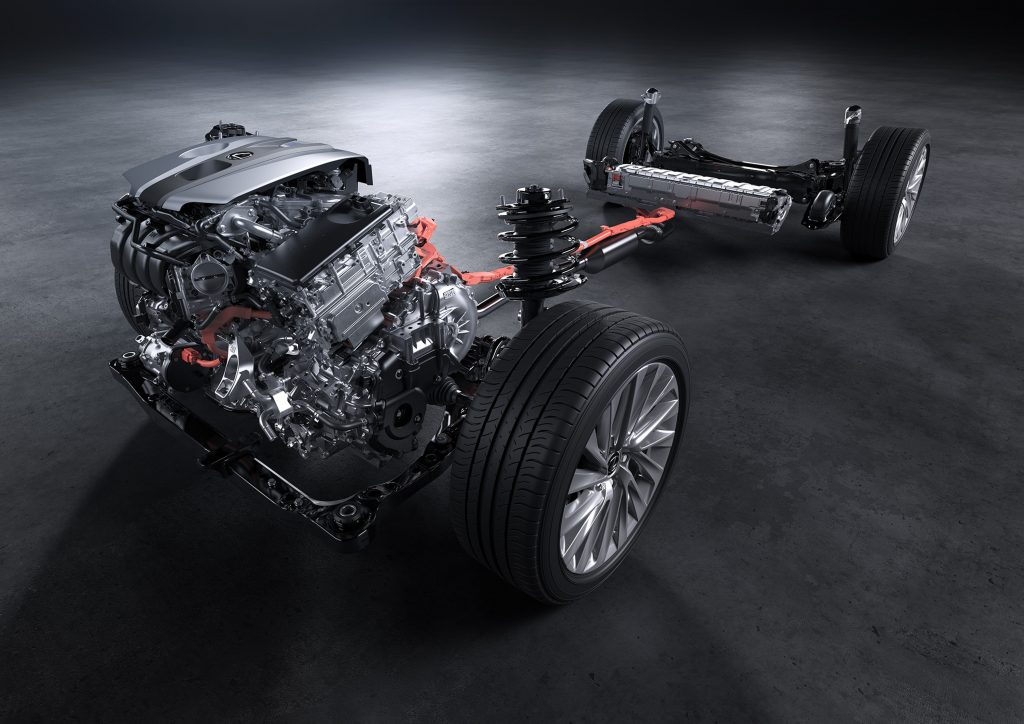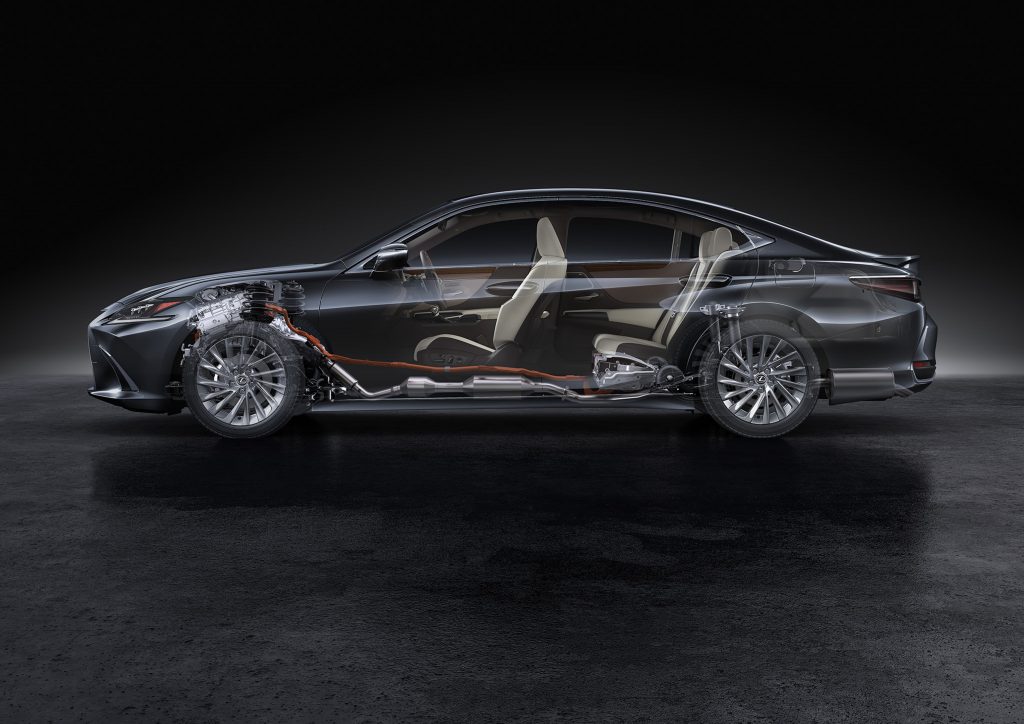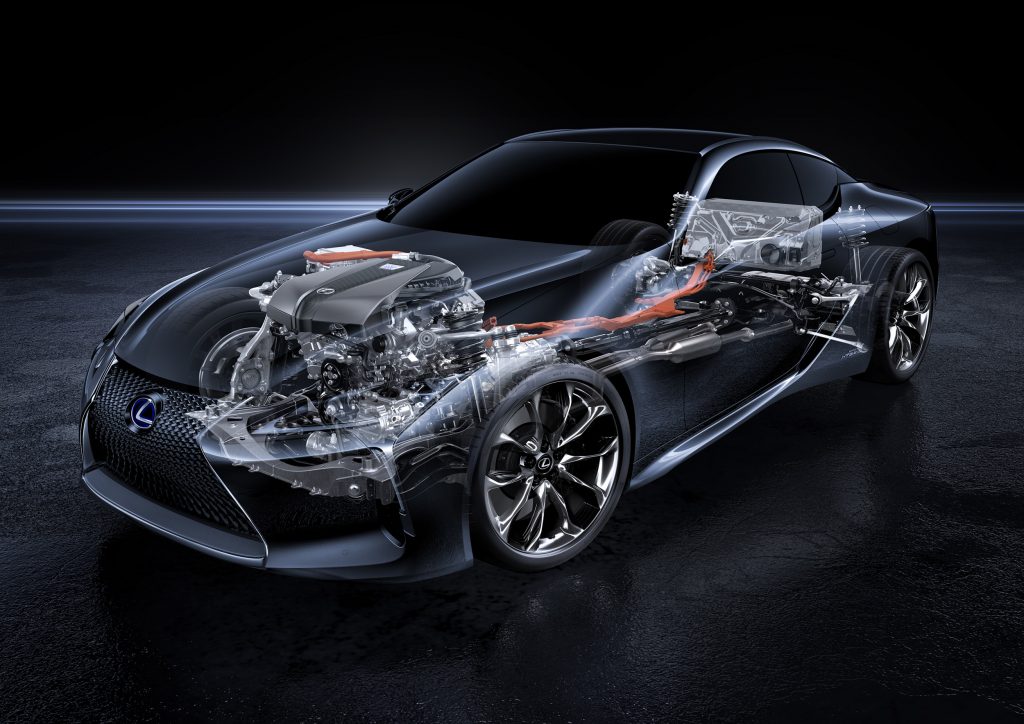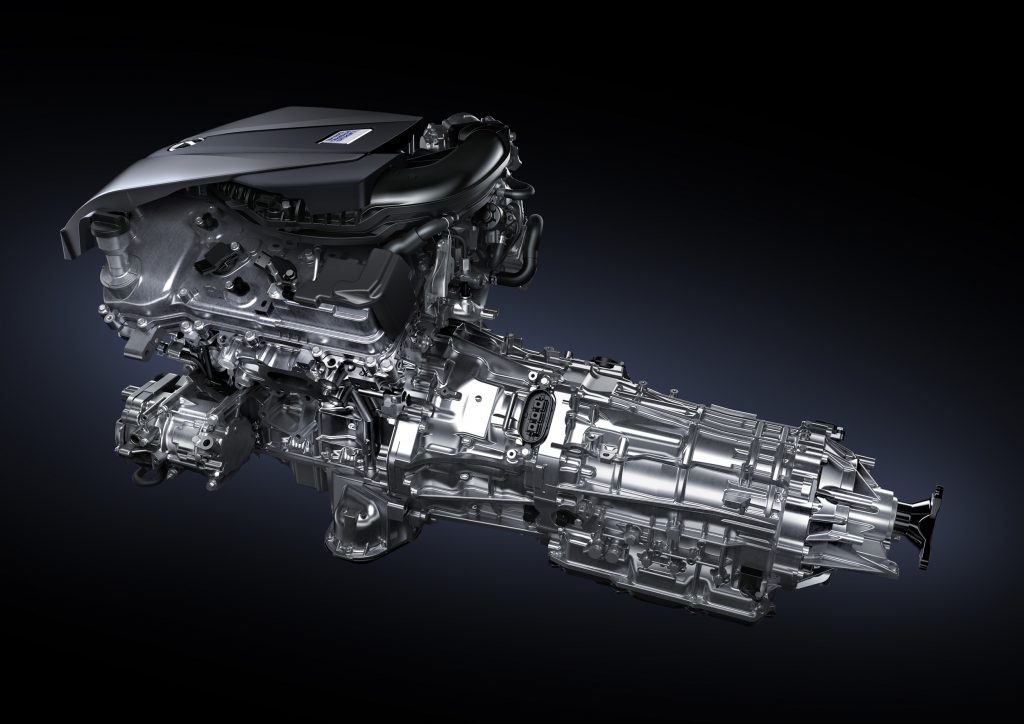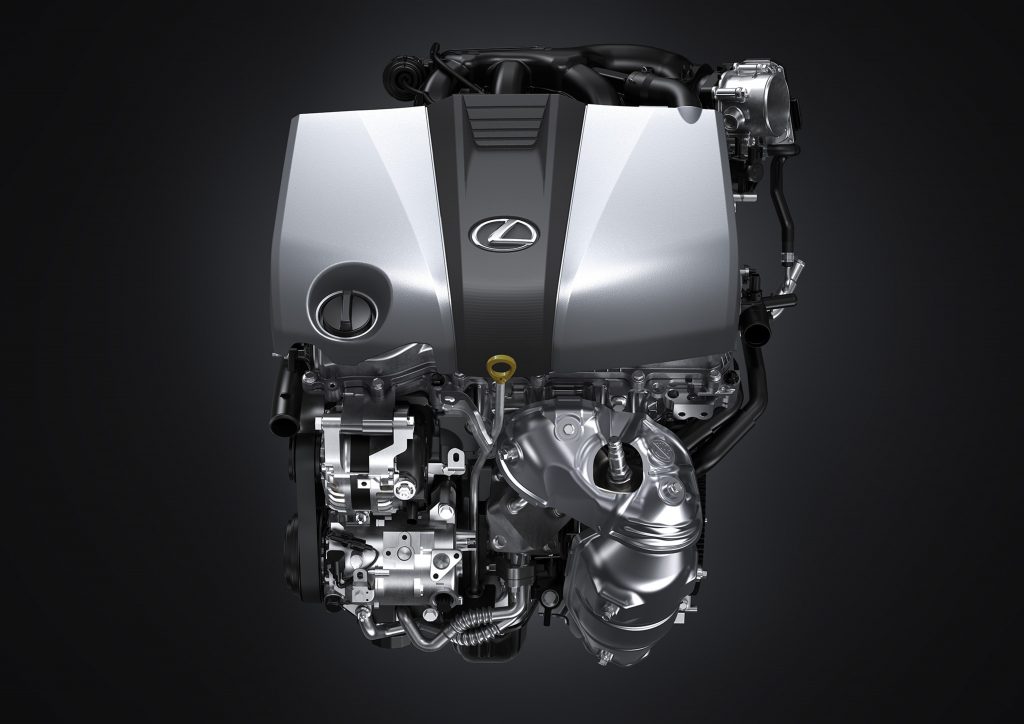The Technology Revolution: Four Generations of Self-Charging Hybrid Electric Power
Ever since its daring, disruptive entry into the luxury car market in 1989, Lexus has repeatedly broken with convention by pioneering new ideas. Principal among these is its long-established leadership in the development of self-charging hybrid electric powertrains – a technology that has changed the motoring landscape for good.
Thirty years ago, powerful, heavy and fuel-thirsty engines were the unchallenged norm for upmarket automobiles. But as the millennium turned, the world was waking up to the immediate challenge of global warming and the need to conserve natural resources. A new solution was needed: step forward Lexus.
The RX 400h: Lexus self-charging hybrid begins
Years of research and development culminated in the RX 400h, the first self-charging hybrid Lexus and world’s first luxury hybrid vehicle, launched in 2005. On the outside it looked little different from the familiar RX 300 SUV, but under the skin things were very different. Yes, there was a 3.3-litre petrol V6 engine under the bonnet, but this was just one element in the radical, all-new self-charging hybrid electric system.
Self-charging hybrid in simple terms
The hybrid concept is an ingenious marriage of an internal combustion engine and an electric motor. Their performance – in unison or individually – is governed automatically and seamlessly by an intelligent system that draws power from the appropriate source to maximise efficiency or performance, as required.
Electric power is generated by the engine while the car is being driven, and is also obtained through conversion of the kinetic energy produced when braking or slowing down. Power is stored in a high-voltage battery that needs no “plug-in” recharging.
Lexus Hybrid Drive is a “full” hybrid technology, which means the vehicle can run on its electric power alone, with zero emissions and fuel consumption. Initially, this was limited to low-speeds and relatively short distances, but as the technology was developed, the EV – electric vehicle – capability increased significantly. Today, Lexus hybrids can travel up to 50 per cent of the time in busy urban traffic, without the petrol engine having to be brought into play.
Flagship power – the second generation
The second generation of Lexus Hybrid Drive raised the game significantly. Such was the technology’s status within the company, it was deployed in its new flagship saloon, the LS 600h, in 2007. As the first hybrid system to feature a V8 engine – a 5.0-litre unit and the most technically advanced Lexus had yet built – it delivered the kind of power and performance typically associated with a V12. The system delivered 439bhp and 520Nm of torque, giving acceleration from nought to 62mph in just 6.3 seconds.
When it came to emissions and fuel economy, however, the LS 600h broke new ground in its class: it returned official combined cycle fuel economy of 30.4mpg and its comparatively low emissions earned it SULEV (Super Ultra Low Emission Vehicle) status in the USA.
A sportier dimension
A sportier aspect of hybrid power was also witnessed in the GS 450h sports saloon. A two-stage motor speed reduction planetary gear was used in both that model and the LS 600h, the latter also benefiting from an upgraded hybrid transmission. The nickel-metal hydride battery produced 280V, but a boost converter could ramp this up to 650V.
The GS 450h and the RX 450h, which superseded the original RX 400h in 2009, were equipped with a new 3.5-litre V6 engine. Thanks to the use of an electronically controlled power split device, the transmission operated like a continuously variable transmission, but with the benefit – for the first time in a hybrid – of a manual shift mode and AI-Shift that used artificial intelligence to adapt performance to the driver’s style and the driving conditions. Lexus was not only improving the efficiency and refinement of its technology, it was also making hybrids more rewarding to drive, too.
More efficient, more responsive
The third generation of Lexus Hybrid Drive made advances both in efficiency and responsiveness. The revised system was first seen in the IS 300h, the first IS to feature hybrid power, which entered the market in 2013.
Central to the improved performance was a new 2.5-litre Atkinson cycle petrol engine, equipped with D-4S direct fuel injection, Dual VVT-i intelligent variable valve-timing and a high-efficiency exhaust gas recirculation system. Combined with the hybrid transaxle, this duly gave class-leading, sub-100g/km CO2 emissions and fuel economy from 65.7mpg.
With further refinements, this system was also adopted for the Lexus NX, the company’s first mid-size crossover, and the RC 300h coupe, both of which joined the range in 2014.
The LC coupe and the Multi Stage Hybrid System
Few cars have made such a spectacular debut as the LC flagship coupe, a bold demonstration of the brave design that’s at the heart of today’s Lexus brand. But while its styling has earned it high praise and awards, the LC also marked a new era in hybrid electric technology. The breakthrough was the Multi Stage Hybrid System, a new transmission device that retains all hybrid’s hallmark efficiency but which takes the driving experience to a higher level.
The LC 500h is equipped with a 3.5-litre V6 engine that revs all the way to 6,600rpm, and benefits from detailed engineering features to promote both performance and efficiency. The Multi Stage Hybrid System allows its potential to be enjoyed to the maximum, by amplifying the output of both the engine and the electric motor, so that performance is optimised at all engine speeds.
For the driver the rewards are more responsive and direct acceleration, greater dynamic performance and all-round driving pleasure – the “even sharper” character that Lexus sought to achieve. With total system output of 354bhp and nought to 62mph acceleration in five seconds, the new powertrain fully justifies its place in a performance model, yet it is still capable of 34.9mpg and produces only 150g/km of CO2. Since its introduction in the LC, the Multi Stage System has also been deployed to excellent effect in the all-new LS 500h, Lexus’s flagship saloon.
Aim higher, deliver better
While other luxury car makers have come to recognise the value of hybrid and developed their own systems, none is able to match Lexus’s breadth of experience. Today the company is leveraging its technology leadership with a fourth generation of Lexus Hybrid Drive that achieves even better fuel efficiency, responsive performance and low emissions.
Featured in the new ES 300h saloon and UX 250h compact crossover launched in early 2019, it combines the benefits of an all-new, ultra-efficient Atkinson cycle engine (2.5-litre in ES, 2.0-litre in UX) with a new electric motor that’s lighter, more compact and more power dense.
10 million kilometres of testing
No effort was spared in this engine’s development, with 60 prototypes built and more than 10 million kilometres of road testing carried out. The result is the most thermally efficient engine yet to be installed in a production vehicle – rated at 41 per cent. This means more of the power potential of every drop of fuel is captured to drive the wheels.
The impact of this is reflected in the car’s benchmark performance data: the ES 300h’s hybrid system delivers 215bhp, with fuel economy from 48.49 to 53.55mpg and CO2 emissions from just 100 g/km[1]. UX 250h’s powertrain has a total output of 181bhp, with fuel emissions from 49.5 to 53.2mpg (WLTP data) and CO2 emissions from 94g/km (NEDC correlated data).
This has been achieved with fast-burn combustion technology that ensures more power is gained without increasing emissions or fuel consumption. Numerous design and engineering details also contribute to the exceptional performance, including VVT-iE electric intelligent intake valve-timing, a new variable capacity oil pump and a variable cooling system to multi-hole fuel injectors.
Saving space, saving weight
Every element in the hybrid transaxle was scrutinised to see how the unit could be made smaller and lighter. The key to its compact size is a new multi-axle arrangement for the electric motors, which reduces the overall length by almost 30mm. The familiar planetary gear system was replaced with a system contained in a single multi-function unit, and further weight and space were saved by using a new lithium-ion battery that is compact enough to be located beneath the rear seats, increasing the boot volume and improving the car’s front/rear weight balance.
Winning the argument
Developing a workable, affordable hybrid system was only part of the battle: Lexus has also had to convince its customers that its revolutionary concept was not just a practical option, but that it also offered all the qualities they required of a luxury model. Strong fuel economy and low emissions had to be matched with sophistication and refinement if premium market customers were going to make the switch from conventional petrol and diesel-powered models.
Lexus hybrids proved themselves to be intrinsically quiet, smooth and refined and, as the years passed, they also demonstrated exceptional reliability. This was not a fragile technology, but robust and highly durable engineering.
Within 15 years Lexus made hybrid central to its brand, extending its reach from a single model in 2005 to a range of 10 vehicles in its European line-up by 2019, covering many different body styles and performance levels. Worldwide, cumulative hybrid sales have passed 1.6 million units, while in Western Europe hybrids now account for 99 per cent of all the new Lexus cars sold in the region (data correct summer 2019).
ENDS

